Gazipasa - Life and income at the Seaside
- Category: Turkish Riviera
- Hits: 8025
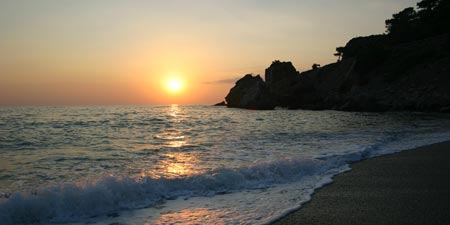
The beautiful and untouched nature of Gazipasa is not a feature restricted to land, the plateaus or the shore. The sea is also an important element in the region.
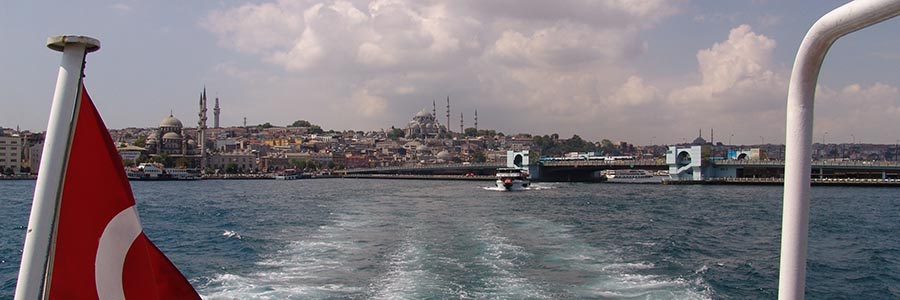
Since the founding of the republic in 1923 as the successor state to the Ottoman Empire, Turkey has been secular and Kemalist in orientation. The country's founder, Mustafa Kemal Atatürk, initiated a modernization of Turkey through social and legal reforms modelled on various European nation states.
The current President Recep Tayyip Erdoğan has been at the helm of the country since 2003. Since around 2012, he has led the country in an increasingly authoritarian manner. Freedom of expression and freedom of the press in particular are considered to be severely restricted. The currency and debt crisis triggered by its economic policies as well as high inflation have continued since 2018, which makes Turkey quite attractive from a tourist perspective.
The culture of today's Turkey is a fusion of the ancient Turkish nomadic culture of Central Asia and Siberia, the Greco-Roman era, the culture in the Ottoman Empire with its Byzantine, Persian, Arabic, Caucasian, Armenian and Kurdish influences, as well as the strong European direction since the founding of the Republic Ataturk. The cultural centre of the country is the metropolis of Istanbul.
With the political changes, the content of Turkish literature also changed. Early representatives include Fakir Baykurt, Sabahattin Ali, Sait Faik Abasıyanık and Yaşar Kemal, who put ordinary people at the centre of their work. With the turn to describing living conditions, social and political criticism of the state is inevitable. The state reacts with censorship and political violence. Authors like Nâzım Hikmet, Yaşar Kemal and Aziz Nesin spend many years in Turkish prisons because of the persecution of their publications. Kemal therefore referred to the prison as a “school of Turkish literature”.
Turkish cuisine has also influenced Greek and the rest of the Balkan cuisine - including etymology. For example, tzaziki comes from the Turkish cacık, and Ćevapčići comes from kabapcik. Yogurt also comes from Turkish Yoğurt. Doner kebab is made from beef, veal or poultry. In Turkey, but also in other countries, the kebab is also served on a plate.

The beautiful and untouched nature of Gazipasa is not a feature restricted to land, the plateaus or the shore. The sea is also an important element in the region.

The ancient City of Selinus is about 45 km away from Alanya and 2 km from the city center of Gazipaşa (follow the signposts). The road follows the river Musa Çay, once called Selinus too.

Almost all of Turkey's banana products orign from the coastline that begin next to Alanya and stretches throughout Gazipasa and Anamur along the coastline.

From Kas, our journey was leading along the coast road D400 in direction to Kumluca and nearly into the center of Finike, when we turned right to the national road 635 towards Elmalı.

Selge as being an old mountainous city in the vicinity of Köprüçay, about 35 km north of Serik and on the southern slopes of the Taurus Mountains, is reached by following the 14 km stabilized road with sharp bends after the Köprülü Canyon National Park. It is supposed that Selge was built by Kalishes.

Turkey is in one of the first positions in the ranking of countries of owning the most caves and waterways below the surface. The number of caves in Turkey is calculated to be more then 40.000.

The ancient city of Syedra is situated on a hill between the present day villages of Kargıcak and Seki, about 18 kilometers south-east of Alanya and 24 kilometres north-west of Selinus, today called Gazipaşa.
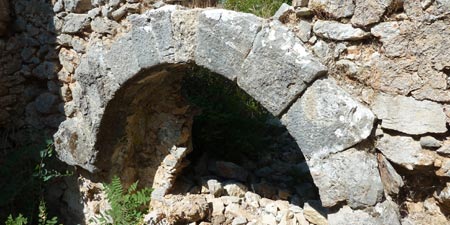
The ancient town Hamaxia, in Turkish Sinek Kalesi, is situated about 6 km to the West of Alanya city centre. From the coast road, after the 2nd tunnel from Alanya (1st tunnel from Manavgat), turn north by a big board showing the direction to Elikesik Tesisleri and you will notice two cement factories (Atam Hazir and Alanya Hazir).
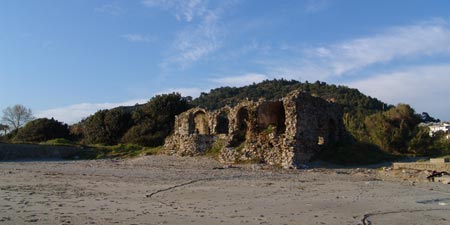
Konaklı is a today rapidly growing former village about 8 miles from the centre of Alanya. It is an independent town which comes under the jurisdiction of the local authority of Alanya.

The iconic Statue of Liberty in New York Harbour was a gift from France, in 1886. But, did its inspiration originate almost 2000 years ago, in Turkey? A recent discovery in the remnants of excavation in one of the country’s most important archaeological sites is cause for speculation.

A Lycia Story in the Country of Lights. A friendly fishing town with a natural harbor which is a good shelter for boats, islands situated randomly in the front, remnants in water and on land that are struggling to shed light on its history, a lovely tiny bay and its pensions which are mixtures of wood and stone.

The Mediterranean Village Dancing under the Shade of History! Kaleköy village which is accessible only by boat or on foot, is is located between Kaş and Demre.

Mysteries of the Ancient World appear inside this Triangle. Kekova is a Mediterranean island near Demre district of Antalya province which faces the villages of Kaleköy (ancient Simena) and Üçağız (ancient Theimiussa). No one lives on the island.

Once you are traveling from Patara to Fethiye, you should try tro visit the imposing canyon of Saklikent at the foot of the Lykian Taurus Mountain. It will take about an hour from Xanthos in using the side road by car, but lot of signs will easily lead you to the canyon.

30 miles to the west of Antalya at the base of the Bey Mountains, which belong to the Olympos National Park, Kemer, one of the most beautiful holiday resorts with a beautiful harbor for sailing ships, is situated. Small and beautifully-decorated shops offer a wide variety of different goods.

Kalkan is thought to be the small issue of Kaş, however, the more exquisite one. In several patios the former fishing village drops to the sea. Restaurants form nice groups around the small harbor, about that white washed villas cuddle up surrounded by small houses closely to the slopes.

Xanthus is mentioned by numerous ancient Greek and Roman historical geographical writers. Strabo notes Xanthos as the largest city in Lycia, as the Capital of the Lycian Town Assembly.
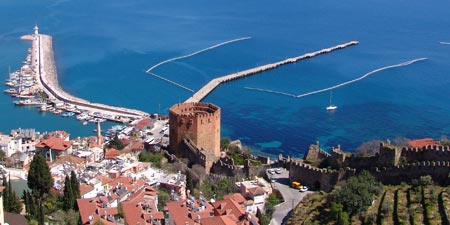
As the Seljuk Sultan Alaaddin Keykubat, after a five years lasting battle, conquered the city of Alanya in 1226, he started to work on plans how to protect the settlement in the future, within these ideas the Red Tower (Kızılkule) was built.

According to the Greek Writer Strabon (63 BC-19 AD) Perge was founded by Greek colonists led by Mopsos and Kalchas who came to Pamphylia after the Trojan War around 1200 BC.

Visiting Perge you can get a good impression of what a Roman towns looked like with its theatres, stadium, agora, baths, streets and town gates, as large parts of the town have been excavated and are still being restored.